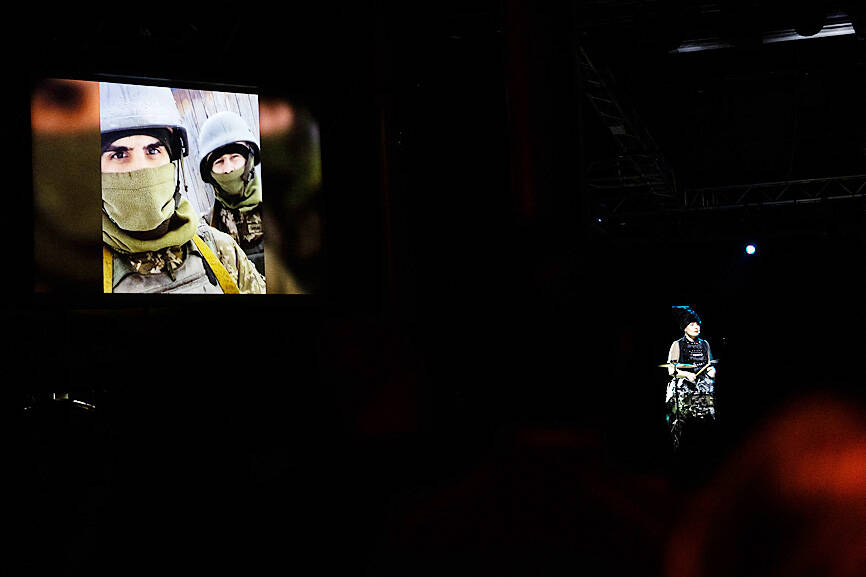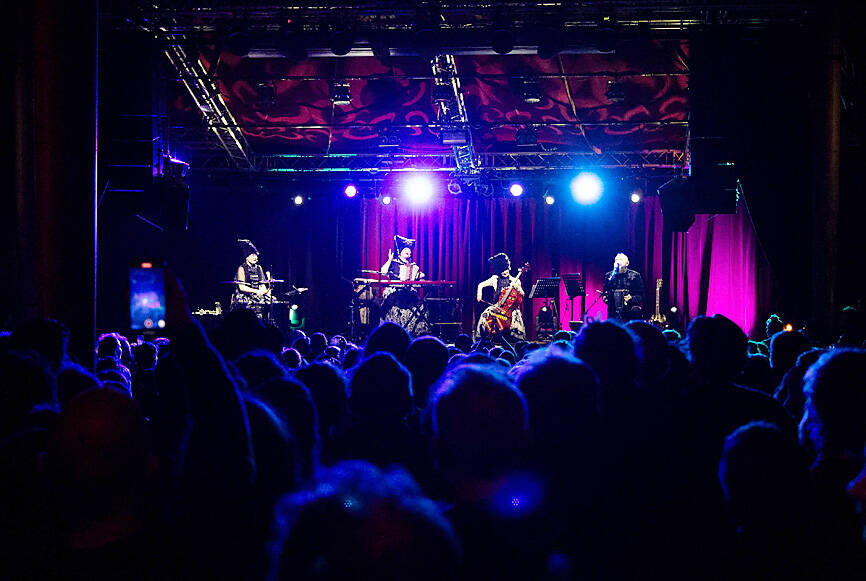A Ukrainian band is treating international audiences to their country’s traditional folk music, spiced up with world music and some rap, with the aim of aiding the struggle against cultural “assimilation” of their country by its neighbor Russia.
Ukraine’s DakhaBrakha ensemble started their performance at the Parisian Cabaret Sauvage with the greeting “Good evening from free Ukraine,” before singer Marko Halanevych, cellist Nina Garenetska, keyboardist Iryna Kovalenko and percussionist Olena Tsybulska launch into the evening’s program.
Wearing identical traditional peasant blouses and layers of necklaces, the group’s three women could pass for sisters. Their tall black hats resembling stove pipes, but are just a fun prop with no actual roots in Ukrainian folklore.

Photo AFP
“We’ve been suffering from Russia’s assimilation policy for three hundred years,” Halanevych said.
After “so many tragic episodes, it’s a miracle that Ukrainian identity, culture and language still exist,” the trained philologist added.
Much of modern Ukraine’s territory was part of the Russian empire under the tsars and then the Soviet Union following the Bolshevik Revolution.

Photo: AFP
Many Western analysts said that Russian President Vladimir Putin long dreamed of absorbing Ukraine into Russian territory even before the February 2022 full-scale invasion.
In conversation, the singer’s fatigue becomes apparent. He admits to being tired, not just from the group’s ongoing tour taking it to France, Switzerland and Luxembourg, but also from the strain brought on by Russia’s war on his country.
DakhaBrakha’s concerts are interspersed with reminders of the conflict, and part of the proceeds go to the national war effort.
“We are aware of course that people in Europe are tired of hearing about it,” Halanevych said. “We understand, and we don’t judge.”
After a two-year break due to the Russian invasion, DakhaBrakha, which has been around for two decades, resumed touring, mostly abroad, but sometimes at home.
Last spring, the quartet performed in Dnipro in the east of the country — where the gig was interrupted three times by air raid sirens — as well as in Chernivtsi, Odesa and Vinnytsia. Next month, it is planning its first studio session since 2020 in Kyiv, which they called “an important and symbolic choice” of location.
The folkloric repertoire has seen a resurgence in Ukraine over the past decades, with ethnomusicologists often recording elderly women to preserve the heritage as faithfully as possible.
However, DakhaBrakha is not shy about lacing central European polyphonic traditions with thumping bass lines, distorted electric guitars and vocal lines akin to rapping.
Their concerts, which have taken them across Europe, the US, Canada, Australia and New Zealand, sometimes have moments of “disconnect” as news from home abruptly bursts into joyful performances with alarm signals from Ukraine flashing up on their smartphone apps.
“Each time we worry about our loved ones,” Halanevych said.
The quartet’s front man is the first to acknowledge that weaponizing music might not be enough of a contribution to the war effort indefinitely, given that Ukraine is finding it increasingly difficult to recruit soldiers.
“We may need more people to take up arms or dig trenches,” he said. “I am ready to defend my country.”
Halanevych’s brother Taras, 37, a journalist and sound engineer, began his military training last month.

Kehinde Sanni spends his days smoothing out dents and repainting scratched bumpers in a modest autobody shop in Lagos. He has never left Nigeria, yet he speaks glowingly of Burkina Faso military leader Ibrahim Traore. “Nigeria needs someone like Ibrahim Traore of Burkina Faso. He is doing well for his country,” Sanni said. His admiration is shaped by a steady stream of viral videos, memes and social media posts — many misleading or outright false — portraying Traore as a fearless reformer who defied Western powers and reclaimed his country’s dignity. The Burkinabe strongman swept into power following a coup in September 2022

‘FRAGMENTING’: British politics have for a long time been dominated by the Labor Party and the Tories, but polls suggest that Reform now poses a significant challenge Hard-right upstarts Reform UK snatched a parliamentary seat from British Prime Minister Keir Starmer’s Labor Party yesterday in local elections that dealt a blow to the UK’s two establishment parties. Reform, led by anti-immigrant firebrand Nigel Farage, won the by-election in Runcorn and Helsby in northwest England by just six votes, as it picked up gains in other localities, including one mayoralty. The group’s strong showing continues momentum it built up at last year’s general election and appears to confirm a trend that the UK is entering an era of multi-party politics. “For the movement, for the party it’s a very, very big

ENTERTAINMENT: Rio officials have a history of organizing massive concerts on Copacabana Beach, with Madonna’s show drawing about 1.6 million fans last year Lady Gaga on Saturday night gave a free concert in front of 2 million fans who poured onto Copacabana Beach in Rio de Janeiro for the biggest show of her career. “Tonight, we’re making history... Thank you for making history with me,” Lady Gaga told a screaming crowd. The Mother Monster, as she is known, started the show at about 10:10pm local time with her 2011 song Bloody Mary. Cries of joy rose from the tightly packed fans who sang and danced shoulder-to-shoulder on the vast stretch of sand. Concert organizers said 2.1 million people attended the show. Lady Gaga

SUPPORT: The Australian prime minister promised to back Kyiv against Russia’s invasion, saying: ‘That’s my government’s position. It was yesterday. It still is’ Left-leaning Australian Prime Minister Anthony Albanese yesterday basked in his landslide election win, promising a “disciplined, orderly” government to confront cost-of-living pain and tariff turmoil. People clapped as the 62-year-old and his fiancee, Jodie Haydon, who visited his old inner Sydney haunt, Cafe Italia, surrounded by a crowd of jostling photographers and journalists. Albanese’s Labor Party is on course to win at least 83 seats in the 150-member parliament, partial results showed. Opposition leader Peter Dutton’s conservative Liberal-National coalition had just 38 seats, and other parties 12. Another 17 seats were still in doubt. “We will be a disciplined, orderly